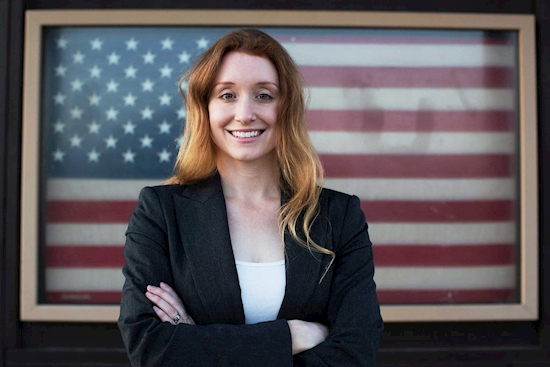This Scientist Wants to Bring 'Star Trek' Values to Congress
Vulcanologist Jess Phoenix never expected to be involved in politics. Until recently her life revolved around science—traveling the world to study different volcanoes and running an educational nonprofit. But the environmental record of the Trump administration has motivated her to run for Congress.
“These guys are basically gutting every environmental protection that existed,” Phoenix says in Episode 284 of the Geek’s Guide to the Galaxy podcast. “It’s a trend we have to stop now. We can’t let this continue.”
Podcast
Phoenix is one of a growing number of scientists who are running for public office, spurred on by the group 314 Action, which helps teach scientists how to organize a political campaign. There’s a growing recognition among them that too many elected officials are ignorant of basic science, and that the only solution is for scientists to get in there and do a better job.
“The science candidates are going to be in favor of things that are scientifically proven to work,” Phoenix says. “That’s the one thing that unites all of us.”
She also has one advantage that sets her apart—the support of Star Trek actors like Tim Russ, Robert Picardo, and John Billingsley, all of whom have appeared in her campaign videos. “John saw the correlation between my positions about issues and the Star Trek universe,” Phoenix says, “and how the ideals of Gene Roddenberry’s future matched up with what I wanted to fight for.”
She says that as a vulcanologist, Star Trek references are a fact of life, since pretty much everyone she meets makes a joke about her studying Vulcans. Her standard response is to give the Vulcan salute and say “live long and prosper.”
“Its convenient because it’s something I actually believe in,” she says. “I do want people to live long and prosper, so I’d say it’s a pretty universally OK message.”
Listen to the complete interview with Jess Phoenix in Episode 284 of Geek’s Guide to the Galaxy (above). And check out some highlights from the discussion below.
Jess Phoenix on Yellowstone:
“When it does erupt again, it will devastate the US. It will basically go east of Wyoming, and it will basically go all the way to Washington, DC. Ashfall has been found—from previous eruptions—all the way over in Virginia. So it has the potential to just be massively devastating. In Southern California we wouldn’t get as much ashfall, but obviously having 75 percent of the country buried under [ash] would cause serious problems. We don’t have to worry about Yellowstone killing us in Southern California, but the rest of the country? Sorry. An eruption that size, a true supervolcano eruption, would devastate not just the US but the entire world. It would screw up economies all around the globe. So it’s not something we want to happen any time soon.”
Jess Phoenix on The Core:
“I was basically in agony through that whole movie. That stuff doesn’t happen. There are no giant crystal caverns under the Earth’s crust. Oh man. I mean, there are crystal caverns that we know about in Mexico, but that’s not the same. That movie made me a little crazy, because I was a friend of someone who knew the writer, and so we got to go to a day-or-two-early screening. And this was in Massachusetts, of all places—I don’t know how we had this connection. But I didn’t know the writer, and they said after the movie, ‘Do you want to go meet him?’ and I was like, ‘No. Sorry. Right now I would be too critical. I’d have to wait.’ I was not that mature at that age either, and I was just like, ‘Oh my god, the science was awful!'”
Jess Phoenix on climate change:
“My dad was very much into ‘Oh, climate change isn’t real’ a few years back. And I would say, ‘Dad, I’m the scientist. I went to school for this. There’s no conspiracy.’ But then I’m really encouraged, because on his Facebook page he shared something that I did, one of the media appearances that I had—I think maybe it was when I was on CNN International talking about why we need scientists in government, Earth scientists in particular—and somebody on his page said, ‘Oh John, it’s just a conspiracy. Follow the money.’ And my dad was like, ‘Well, my daughter’s not getting paid off for this, so I think there’s something to it. I know she stands firm in her convictions’—or something to that effect. So I think he’s starting to see that [it’s real].”
Jess Phoenix on fundraising:
“Some [scientists] have gotten fairly wealthy patenting their discoveries, but for most scientists—particularly Earth scientists—your biggest disadvantage will be that you don’t have a massive, built-in donor network. Because scientists haven’t been politically active. So if I were to call up—and I’ve done this—if I were to call up 10, or 20, or 50 of my scientific colleagues and say, ‘Hey, donate to my political campaign,’ they’re not used to doing that. Lawyers are used to donating to other lawyers running for office, and the same goes for businesspeople, because they make up 80-plus percent of Congress right now. There’s one physicist in Congress—Bill Foster in Illinois—and that’s it. So you can see we have a hard row to hoe.”
Go Back to Top. Skip To: Start of Article.Source: www.wired.com

